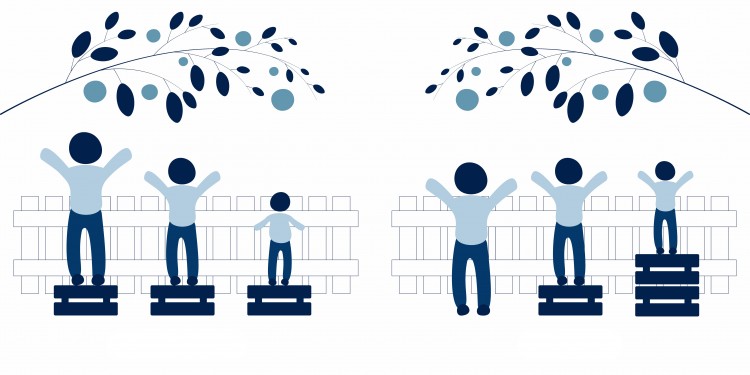
Is equality just?
The project, which is being funded for the next few years with a € 1.6 million Consolidator Grant from the European Research Council, is headed by its initiator, Niels Petersen, Professor of Public Law, International Law, EU Law, and Empirical Legal Studies at the University of Münster.
Niels Petersen was born in Stade, a town not far from Hamburg, in 1978, and he directly addressed the subject of equality in his inaugural lecture at Münster University in 2016. After the subject’s potential had become increasingly clear to him, he submitted an application for funding in the winter semester of 2017/18 and put together team of international researchers to look at the issue. “The subject is a very attractive one for a lot of people – precisely against the background of their personal biographies,” he explains. “We received some very good applications.” The doctoral students on the team of researchers include women from Brazil, India, Poland, Liechtenstein and Ethiopia. One of the competences necessary for carrying out research into different legal systems is special language skills, as the team is looking at 16 different jurisdictions on every continent – in the USA, Canada, Brazil, Columbia, New Zealand, India, Taiwan, South Africa, the African Court on Human and Peoples’ Rights, Germany, Poland, Spain, the UK, France and the European Court of Human Rights. The research project began in 2019 and is set to run until 2024.

The prime example of a country which has such a model is Germany, although it is also prevalent in Poland and France, in other words in continental Europe. The opposing model asks which groups of people are in particular need of protection because of discrimination on the basis of their gender, religion or race – so differentiations are formulated which might possibly be based on problematic criteria. The prime example of a country which has this model is the USA. “This model, which is, incidentally, the one which most countries in the world follow,” says Petersen, “gives legislatures more scope, but has the disadvantage that cases which may appear to be individually unjust often cannot be corrected. It would be appropriate,” he adds, “to examine the question of whether separate taxation for married couples – which is still in force today and is based on the fact that, as a rule, a husband earns more than his wife – is not outdated, representing, as it does, an indirect discrimination of women because it deters them from going out to work.” The courts have not yet dealt with this issue, but Petersen does not think that a lawsuit on the matter would be without any prospect of success.
What are the reasons for these differing models? This is also a question which the research project is investigating. “Since the 1970s, rulings given by US courts were very influential, and this is probably the reason why the second model is prevalent internationally,” says Petersen. On the other hand, he adds, German court rulings developed and became established long before that, which meant that a similar degree of influence was not possible. Nor can it be clearly stated which of the two models is ultimately the better one. Equality and justice are big words, which are difficult to define. “Equality exists when equal things are treated equally and unequal things unequally,” he explains. But what is ‘equal’ or ‘unequal’? Must people who have been vaccinated and those who haven’t be treated unequally? Do we proceed from the fact of vaccination, or from the fact that we are all essentially citizens with equal rights?
It is just as difficult to answer questions of equality at the global level. For this reason, the global distribution of vaccines is a difficult question of justice. Petersen urges that “it is politically wise to distribute vaccines equally at the global level.” This specific example emphasises just how relevant the results of the research project might be for the wider public. For this reason, Niels Petersen plans to publish the results not only as an academic book with relevant essays, but also in a more popular form.
Gerd Felder
Translated from the German by Ken Ashton
This article was first published in the University newspaper wissen|leben No. 4, 16 June 2021.
